CRI实用英语课堂 Unit 25 Environmental Protection II 环境保护(中)(在线收听)
Part 4 Air Pollution 空气污染
Air is the ocean we breathe. Air supplies us with oxygen which is essential for our bodies to live. Air is 99.9% nitrogen, oxygen, water vapor and inert gases. Human activities ca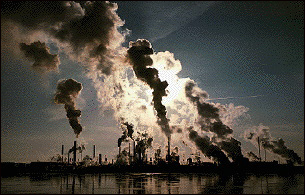 n release substances into the air, some of which can cause problems for humans, plants, and animals.
n release substances into the air, some of which can cause problems for humans, plants, and animals.
There are several main types of pollution and well-known effects of pollution which are commonly discussed. These include smog, acid rain, the greenhouse effect, and "holes" in the ozone layer. Each of these problems has serious implications for our health and well-being as well as for the whole environment.
One type of air pollution is the release of particles into the air from burning fuel for energy. Diesel smoke is a good example of this particular matter. This type of pollution is sometimes referred to as "black carbon" pollution. The exhaust from burning fuels in automobiles, homes, and industries is a major source of pollution in the air. Some authorities believe that even the burning of wood and charcoal in fireplaces and barbeques can release significant quantities of soot into the air.
Another type of pollution is the release of noxious gases, such as sulfur dioxide, carbon monoxide, nitrogen oxides, and chemical vapors. These can take part in further chemical reactions once they are in the atmosphere, forming smog and acid rain.
Smog is a type of large-scale outdoor pollution. It is caused by chemical reactions between pollutants derived from different sources, primarily automobile exhaust and industrial emissions. Cities are often centers of these types of activities, and many suffer from the effects of smog, especially during the warm months of the year.
Another consequence of outdoor air pollution is acid rain. When a pollutant, such as sulfuric acid combines with droplets of water in the air, the water or snow can become acidified . The effects of acid rain on the environment can be very serious. It damages plants by destroying their leaves, it poisons the soil, and it changes the chemistry of lakes and streams. Damage due to acid rain kills trees and harms animals, fish, and other wildlife.
The Greenhouse Effect, also referred to as global warming, is generally believed to come from the build up of carbon dioxide gas in the atmosphere. Carbon dioxide is produced when fuels are burned. Plants convert carbon dioxide back to oxygen, but the release of carbon dioxide from human activities is higher than the world's plants can process. The situation is made worse since many of the earth's forests are being removed, and plant life is being damaged by acid rain. Thus, the amount of carbon dioxide in the air is continuing to increase. This buildup acts like a blanket and traps heat close to the surface of our earth. Changes of even a few degrees will affect us all through changes in the climate and even the possibility that the polar ice caps may melt.
Ozone depletion is another result of pollution. Chemicals released by our activities affect the stratosphere , one of the atmospheric layers surrounding earth. The ozone layer in the stratosphere protects the earth from harmful ultraviolet radiation from the sun. Ultraviolet radiation is known to cause skin cancer and has damaging effects on plants and wildlife.
Pollution also needs to be considered inside our homes, offices, and schools. Some of these pollutants can be created by indoor activities such as smoking and cooking.
In many countries in the world, steps are being taken to stop the damage to our environment from air pollution. Scientific groups study the damaging effects on plant, animal and human life. Legislative bodies write laws to control emissions. Educators in schools and universities teach students, beginning at very young ages, about the effects of air pollution.
The first step to solving air pollution is assessment . Researchers have investigated outdoor air pollution and have developed standards for measuring the type and amount of some serious air pollutants. Scientists must then determine how much exposure to pollutants is harmful. Once exposure levels have been set, steps can be undertaken to reduce exposure to air pollution. These can be accomplished by regulation of man-made pollution through legislation. Many countries have set controls on pollution emissions for transportation vehicles and industry.
Prevention is another key to controlling air pollution. The regulatory agencies mentioned above play an essential role in reducing and preventing air pollution in the environment.
In addition, it is possible to prevent many types of air pollution that are not regulated through personal, careful attention to our interactions with the environment. Only through the efforts of scientists, business leaders, legislators, and individuals can we reduce the amount of air pollution on the planet. This challenge must be met by all of us in order to assure that a healthy environment will exist for ourselves and our children.
所谓干洁空气是指在自然状态下的大气,由混合气体、水气和杂质组成,当大气中污染物质的浓度达到有害程度,以至破坏生态系统和人类正常生存和发展的条件,对人或物造成危害的现象叫做大气污染。造成大气污染的原因,既有自然因素又有人为因素,尤其是人为因素,如工业废气、燃烧、汽车尾气和核爆炸等。随着人类经济活动和生产的迅速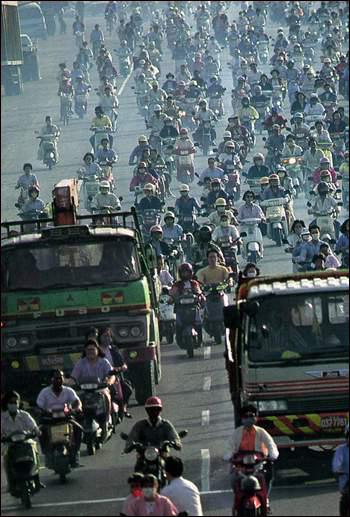 发展,在大量消耗能源的同时,同时也将大量的废气、烟尘物质排入大气,严重影响了大气环境的质量,特别是在人口稠密的城市和工业区域。
发展,在大量消耗能源的同时,同时也将大量的废气、烟尘物质排入大气,严重影响了大气环境的质量,特别是在人口稠密的城市和工业区域。
大气中的二氧化碳浓度增加,阻止地球热量的散失,使地球发生可感觉到的气温升高,这就是有名的“温室效应”,致使地球气温上升。
随着工业化和能源消费增多,酸性排放物也日益增多,它们进入空气中,经过一系列化学作用就形成了酸雨。人们对酸性排放物已经有了控制,但仍然还有酸雨现象。大气尘埃可能是造成酸雨问题的另一原因。
臭氧层是地球最好的保护伞,它吸收了来自太阳的大部分紫外线。然而近二十年的科学研究和大气观测发现:每年春季南极大气中的臭氧层一直在变薄,事实上在极地大气中存在一个臭氧“洞” 通过不断的科学研究,人们发现人类社会活动释放的物质严重的破坏了臭氧层,当然这种现象还受到这一地区独特的气象状态(极涡、寒冷的平流层温度、极地平流层云)的影响。
大气被污染后,由于污染物质的来源、性质和持续时间的不同,被污染地区的气象条件、地理环境等因素的差别,以及人的年龄、健康状况的不同,对人体造成的危害也不尽相同。大气污染对人体的危害主要表现为呼吸道疾病;对植物可使其生理机制受抑制,生长不良,抗病抗虫能力减弱,甚至死亡;大气污染还能对气候产生不良影响,如降低能见度,减少太阳的辐射而导致城市佝偻病发病率的增加;大气污染物能腐蚀物品,影响产品质量;近十几年来,不少国家发现酸雨,雨雪中酸度增高,使河湖、土壤酸化、鱼类减少甚至灭绝,森林发育受影响,这与大气污染是有密切关系的。
大气污染对气候的影响很大,大气污染排放的污染物对局部地区和全球气候都会产生一定影响,尤其对全球气候的影响,从长远的观点看,这种影响将是很严重的。由于人类对自然的严重破坏,在世界范围内掀起了保护大气环境的浪潮。许多国家围绕大气污染物的来源与归宿,大气化学过程中的反应机理及效应进行了大量的研究工作,促进了人类对一系列环境问题的认识。
Dialogue Script 对话原文 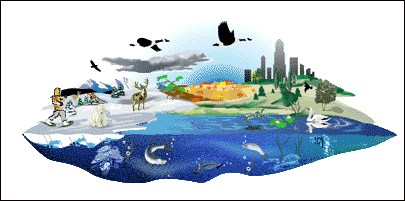
David: The air in Beijing is seriously polluted. Look! I can even see the floating dirt overhead.
Li: Yes, air pollution in China is extremely serious, especially in cities with heavy industry.
David: Isn't there any protecting measure adopted by government for the sake of people's health?
Li: There are many. But some depurating devices are not so effective. Some effective devices are so expensive that manufacturers can't even afford.
David: That's it. Then why not consider reducing some heavy industries?
Li: Pretty hard! China is a developing country and needs heavy industries to increase it's GDP.
David: How about transferring some plants to suburbs?
Li: It's a good idea! There is a low population density in suburbs so that the harm to people is also slight. However, it brings great inconvenience.
讲解:
1. 对话中David和李平在讨论有什么办法能够缓解现在城市中的空气污染状况。David抱怨说北京空气污染真的很严重,都能看见上空飘着的浮尘。pollute是污染的意思,常用的句式就是pollute something with something,for example, Rivers are polluted with chemical waste from factories. 河流被工厂排放的化学废料污染了。
2. 如果用到比喻当中,pollute可以表示“玷污或亵渎某事物,破坏”,那么我们再来延伸一下,pollutant,污染物,pollution,pollute的名词形式,污染。
3. 李平也说中国的空气污染很严重,尤其是那些重工业城市,heavy industry,就是“重工业”,那么轻工业呢,就是“light industry”。David问难道政府没有为了人们的健康而采取措施吗?adopt表示“采取,采用”,例如:They adopted our methods. 他们采用了我们的办法。Adopt还表示“收养”,She adopted a baby girl last year. 她去年收养了一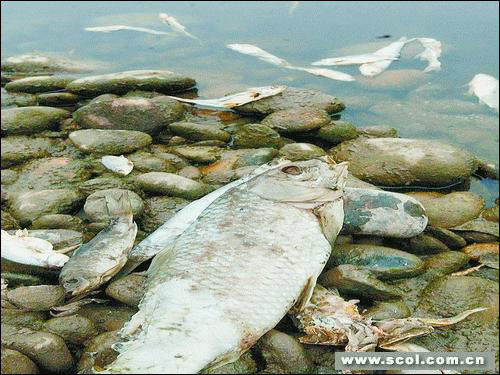 个女婴。
个女婴。
4. sake表示“为了…之好处, 出于对...的兴趣, 缘故, 理由”,那么由它组成的短语for the sake of something或者for one's sake,就表示“为了…好处;为…着想”,I stopped smoking for the sake of my health.为了我的健康我戒烟了。She only did that for her own sake. 她那么做只是为了她自己。
5. sake还以用来加强语气,表示迫切的请求 或不耐烦,例如:for God's sake 看在上帝的份上for Christ's sake 看在基督面上,看在老天面上,比如说,你正在专心读书准备考试,但是隔壁正在开party,你就可以大喊,For God's sake, stop making the noise! I'm trying to read!
6. 政府当然会采取措施来控制空气污染,只是很多净化空气的设备不是很有效,而很多工厂又支付不起效果显著但是非常昂贵的机器设备。afford,表示“能够提供,负担得起”,既可以指实质性的东西,比如金钱,也可以指一些抽象的东西,比如时间、感情等等,例如:I can't afford a new car. 我买不起新车。He's so busy that he can't even afford an hour for lunch. 他太忙了,甚至抽不出一小时来吃午饭。
7. David说,既然负担不起,就减少一些重工业好了,但是李平觉得这很难,因为中国是一个发展中国家,需要重工业来发展经济,GDP就是国内生产总值,gross domestic product。David又建议说或者可以把一些工厂搬到郊区,那里人口密度小,空气的污染面相对就会小一些。但是这又会带来极大的不便。
Part 5 Water Pollution 水污染
Comprising over 70% of the Earth's surface, water is undoubtedly the most precious natural resource that exists on our planet. Without the seemingly unvaluable compound comprised of hy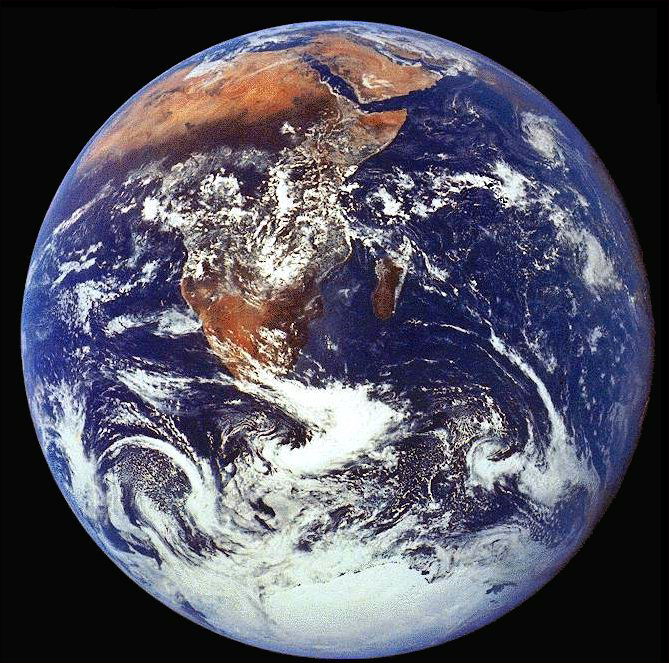 drogen and oxygen, life on Earth would be non-existent: it is essential for everything on our planet to grow and prosper. Although we as humans recognize this fact, we disregard it by polluting our rivers, lakes, and oceans. Subsequently, we are slowly but surely harming our planet to the point where organisms are dying at a very alarming rate.
drogen and oxygen, life on Earth would be non-existent: it is essential for everything on our planet to grow and prosper. Although we as humans recognize this fact, we disregard it by polluting our rivers, lakes, and oceans. Subsequently, we are slowly but surely harming our planet to the point where organisms are dying at a very alarming rate.
Water pollution occurs when a body of water is adversely affected due to the addition of large amounts of materials to the water. The sources of water pollution are categorized as being a point source or a non-source point of pollution. Point sources of pollution occur when the polluting substance is emitted directly into the waterway. A pipe spewing toxic chemicals directly into a river is an example. A non-point source occurs when there is runoff of pollutants into a waterway, for instance when fertilizer from a field is carried into a stream by surface runoff.
There are several types of water pollution. A toxic substance is a chemical pollutant that is not a naturally occurring substance in aquatic ecosystems. The greatest contributors to toxic pollution are herbicides, pesticides and industrial compounds.
Organic pollution occurs when an excess of organic matter, such as manure or sewage, enters the water. When organic matter increases in a pond, the number of decomposers will increase. These decomposers grow rapidly and use a great deal of oxygen during their growth. This leads to a depletion of oxygen as the decomposition process occurs. A lack of oxygen can kill aquatic organisms. As the aquatic organisms die, they are broken down by decomposers which leads to further depletion of the oxygen levels.
Thermal pollution can occur when water is used as a coolant near a power or industrial plant and then is returned to the aquatic environment at a higher temperature than it was originally. Thermal pollution can lead to a decrease in the dissolved oxygen level in the water while also increasing the biological demand of aquatic organisms for oxygen.
Ecological pollution takes place when chemical pollution, organic pollution or thermal pollution are caused by nature rather than by human activity. An example of ecological pollution would be an increased rate of siltation of a waterway after a landslide which would increase the amount of sediments in runoff water. Another example would be when a large animal, such as a deer, drowns in a flood and a large amount of organic material is added to the water as a result. Major geological events such as a volcano eruption might also be sources of ecological pollution. And this is just one of the biggest problems facing the countries now which were hit by tsunami in December last year.
There are many sources of water pollutants.Farms often use large amounts of herbicides and pesticides, both of which are toxic pollutants. These substances are particularly dangerous to life in rivers, streams and lakes, where toxic substances can build up over a period of time. Farms also frequently use large amounts of chemical fertilizers that are washed into the waterways and damage the water supply and the life within it.
Waste and sewage generated by industry can get into the water supply, introducing large organic pollutants into the ecosystem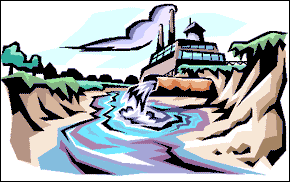 . Many industrial and power plants use rivers, streams and lakes to despose of waste heat. The resulting hot water can cause thermal pollution. Thermal pollution can have a disasterous effect on life in an aquatic ecosystem as temperature increaces decreace the amount of oxygen in the water, thereby reducing the number of animals that can survive there.
. Many industrial and power plants use rivers, streams and lakes to despose of waste heat. The resulting hot water can cause thermal pollution. Thermal pollution can have a disasterous effect on life in an aquatic ecosystem as temperature increaces decreace the amount of oxygen in the water, thereby reducing the number of animals that can survive there.
Water can become contaminated with toxic or radioactive materials from industry, mine sites and abandoned hazardous waste sites. Acid precipitation is caused when the burning of fossil fuels emits sulfur dioxide into the atmosphere. The sulfur dioxide reacts with the water in the atmosphere, creating rainfall which contains sulfuric acid. As acid precipitation falls into lakes, streams and ponds it can lower the overall pH of the waterway, killing vital plant life, thereby affecting the whole food chain.
Sewage generated by houses or runoff from septic tanks into nearby waterways, introduce organic pollutants that can cause eutrophication. Fertilizers, herbicides and pesticides used for lawn care can runoff and contaminate the waterway. As with agriculteral fertilizers, home fertilizers can lead to the eutrophication of lakes and rivers.
Improper disposal of hazardous chemicals down the drain itroduce toxic materials into to the ecosystem, contaminating the water supplies in a way that can harm aquatic organisms. Leaks of oil and antifreeze from a car on a driveway can be washed off by the rain into nearby waterways, polluting it.
Clearly, the problems associated with water pollution have the capabilities to disrupt life on our planet to a great extent. In order to combat water pollution, we must understand the problems and becomepart of the solution.
As we head into the 21st century, awareness and education will most assuredly continue to be the two most important ways to prevent water pollution. If these measures are not taken and water pollution continues, life on earth will suffer severely.
水体因某种物质的介入,而导致其化学、物理、生物或者放射性等方面特征的改变,从而影响水的有效利用,危害人体健康或者破坏生态环境,造成水质恶化的现象称为水污染。
水污染物源于很多的人类活动。工业污染物可从工厂中的排泄管流出,或者可从管道和地下储存罐中外泄。受污染的水也可能是从矿山流出,而流经矿山的水通过含矿物的岩石的沥滤,或已受到加工矿石的化学制品的污染。
城市和其他居民区的水污染大多源自下水道中混有的微量家庭化学制品。有时工厂将污染物排泄到城市的污水系统中,使城区各种污染物质增多。来自于像农田。牧草场、饲育场和大农场等农业源头的污染物有动物粪便、农业化学制品以及腐蚀过程中产生的沉淀物。 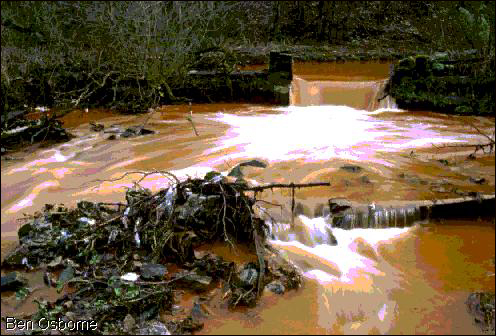
人类的活动会使大量的工业、农业和生活废弃物排入水中,使水受到污染。目前,全世界每年约有4200多亿立方米的污水排入江河湖海,污染了5.5万亿立方米的淡水,这相当于全球径流总量的14%以上。
水污染有两类:一类是自然污染;另一类是人为污染。当前对水体危害较大的是人为污染。水污染可根据污染杂质的不同而主要分为化学性污染、物理性污染和生物性污染三大类
在发展工业,建设城市的同时,就要注意到水资源的保护。因为一旦水资源受到污染,将严重的制约工业、农业的发展以及人类的生存。
Dialogue Script 对话原文
Sarah: The more I learn about the world around me, the more aware I become of the problems facing us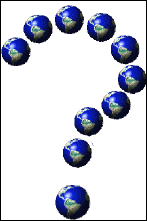 .
.
Bob: Do you mean the problems here in China?
Sarah: Yes, here and all over the world.
Bob: Well, there's one problem I'm certainly aware of and that is the environmental pollution all around us.
Sarah: That is one of the great problems, but in many parts of the world, as people become more aware and apply new technology to solving the pollution problem; there is hope for the future.
Bob: What technology will help with pollution control?
Sarah: Well, for example, I've recently read an article about using certain types of bacteria to help control some pollution problems.
Bob: How could that be? I thought bacteria just caused illness.
Sarah: That's not true. Bacteriologists have identified certain strains of bacteria that "eat" petroleum products, such as oil and gasoline.
Bob: That sounds strange. How does it work?
Sarah: They ingest the petroleum and excrete hydrogen and oxygen, leaving a clean environment behind them.
Bob: Could they use that little bug to clean up big oil spills?
Sarah: Yes, as a matter of fact, they are being proven to be the most successful method of cleaning up after land-based oil spills and are useful for marine spills.
Bob: Wow! Are there other types of pollution that those microbes like to eat?
Sarah: Sure, bacteria have been used to remove arsenic from the sludge produced by gold mining operations. There are seven experiments being done now to reduce nuclear waste to a harmless residue.
Bob: Maybe those bacteria that we used to worry about will eventually save the world!
讲解:
1. 对话中Sarah 和Bob在为世界的环境污染状况担忧。Sarah说The more I learn about the world around me, the more aware I become of the problems facing us. 这里我们又看到了the more…, the more…这个句式,就是两个比较级形式重叠起来,表示“越…就…”,在以前的实用英语课堂中我们提到过。后面的句子,the more aware I become of the problems facing us. 把顺序调整过来就是I become more aware of the problems facing us. 一定要注意这个句式中的语序,别丢三落四的。这里就不能丢掉这个of,因为of是be /become aware of 这个短语的重要组成部分。
2. be /become aware of表示“知道,了解”,相当于know,只不过感觉上要更正式一些。例如:I was not aware of President's being here.我不知道总统先生在这。
3. 环境污染是全世界共同关心的问题,而不仅仅是中国。但是Sarah相信,随着人们对环境污染的认识越来越清醒,并使用新的技术解决污染问题,未来还是大有希望的。那么有哪些技术能有利于环境污染的治理呢?真是太多了,比如,Sarah在这里就提到了一种细菌,就是“bacteria”,能够控制污染。
4. Bob问细菌不是导致疾病的吗?其实并不是所有的细菌都能导致疾病的。细菌学家已经发现,某些种类的细菌能够“吃掉”石油产品,例如机油和汽油。这些细菌把汽油等石油产品吃下肚,然后排出氢气和氧气,从而使周围的环境变得清洁。这些细菌可以用来清除大片泄漏的油污。事实上,这样的细菌已经被证明是清除陆地上泄漏油污的最成功的方法,对清除海洋泄漏油污也很有效果。他们还可以被用来清除金矿开采所产生的污泥中的砷。有人还在进行试验,把核废料转化成无害物。说不定我们以前害怕的细菌最终能拯救世界呢。